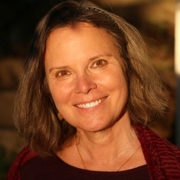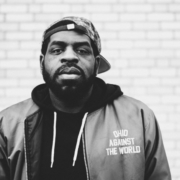CPCC’s Sensoria Festival 2019 – April 5-12
Editor’s Note: Please join Charlotte Lit and CPCC on Monday April 8 to celebrate Judy Goldman, Sensoria’s 2019 winner of the Irene Blair Honeycutt Lifetime Achievement Award in Literary Arts. A reception in Tate Lobby at 6 pm is followed at 7 pm by the Award Presentation and a reading by and conversation with Goldman. Charlotte Lit is honored to partner with CPCC to present this award.
The writer’s role as truth-teller
By Alexia Paul and Lisa Rubenson
A thriving literary community demands diverse voices. So it’s a point of pride in Charlotte that Sensoria – CPCC’s annual literary arts festival – attracts a wide spectrum of writers.
Last year, U.S. Poet Laureate Tracy K. Smith left Sensoria-goers beautifully awed. Her searing take on our country’s forever us-and-them struggle hit close to home for a city seeking healing in the wake of civic unrest and protests over racial injustice. The year before, Sensoria welcomed George Saunders, who received the 2017 Man Booker Prize for his novel, Lincoln in the Bardo.
Sensoria now continues its 26-year tradition of showcasing a range of literary talent. Poet-turned-memoirist Carolyn Forché has spent her career chronicling the painful intersection of the individual and the larger forces of war, violence, and protest in Latin America. Her term, “poetry of witness” reflects a life spent giving voice to those unable to share their own in times of turmoil and persecution.
Poet and essayist Hanif Abdurraqib is himself a poet of witness, using his kinetic wit to tap into the often devastating reality of growing up black in America. Music is a through line in his work, welcoming us in to his worldview and giving us a beat by which we can stay connected to his story.
Carolyn Forché
 Carolyn Forché’s haunting new memoir begins in 1978 when Leonel, a mere acquaintance, requests that she travel to El Salvador to bear witness to a civil war in which 75,000 civilians would die at the hands of a repressive regime. At the time, Forché was a 27-year-old American poet. Doubtful of her purpose on this mission, she continually asks, why me? Why not a journalist or historian? Does her role as a poet augment or diminish her credibility?
Carolyn Forché’s haunting new memoir begins in 1978 when Leonel, a mere acquaintance, requests that she travel to El Salvador to bear witness to a civil war in which 75,000 civilians would die at the hands of a repressive regime. At the time, Forché was a 27-year-old American poet. Doubtful of her purpose on this mission, she continually asks, why me? Why not a journalist or historian? Does her role as a poet augment or diminish her credibility?
As we read, we are witnesses to her witnessing this historic atrocity unfold. The book is almost painfully intimate and demands we not look away, just as Forché chose to not look away. What You Have Heard is True asks the questions: what is the responsibility of storytellers to record and reflect the world around us? What role do poetry and prose have in pursuing and achieving social justice? As she weighs the decision to go to El Salvador, Forché accepts the weight of responsibility: “I knew that if I didn’t accept his invitation, I could never live as if I would have been willing to do something, should an opportunity have presented itself. I could never say to myself: If only I’d had the chance.”
What You Have Heard is True is a testament to the power of the written word to remember – even the most horrific circumstances. In a 2017 interview, Forché said:
[Leonel] believed that poetry would affect the world. And it would affect the world not only in our time but in the times to come, because in Latin America, and in many other countries, and in our own country, I would argue, poetry does survive the age. We’re still reading Walt Whitman’s poems about nursing soldiers wounded in the Civil War. We’re still reading. [Source]
We’re still reading. We’re still writing. And, it matters. – AP
Hanif Abdurraqib

Photo by Andrew Cenci
As poet and essayist Hanif Abdurraqib tells us on the cover of his new book, Go Ahead in the Rain: Notes to A Tribe Called Quest, he has written “a love letter to a group, a sound, and an era.”The memoir is part homage to the rap group whose music foregrounded the author’s experience growing up black in the 1990s in Columbus, Ohio, part autobiography, and part primer on the black community’s contribution to music-making through time.
Abdurraqib seamlessly intertwines the rise, fall and reimagining of A Tribe Called Quest with his own coming-of-age story. His writing moves in and out of the personal and universal, the cultural and historical, amplifying the impact of artists in a community and a shared cultural experience on the journey of a people.
Large lessons emerge from Go Ahead in the Rain. For one, we needn’t have grown up listening to hip-hop or rap to understand their importance and feel their legacy reverberate across a generation. Abdurraqib shows us that music can anchor us in time, place and visceral emotion, before setting us free to imbue it with our own meaning.
And, we don’t have to have experienced another’s pain in order to bear witness to it. One way we do this is through art, by allowing ourselves to be moved to the edge of our senses by the lyricism of an image or feeling, turned to prose. Meditating on the idea of mercy as a momentary suspension of fear, Abdurraqib writes:
All of this is about mercy. I’m talking about what it is to be from a place that promises to love you while holding a gun to your neck. I’m talking about what it feels like to have the gun lowered, briefly, by the hands of some unseen grace. Sometimes, it is a protest that stretches long into a night, or sometimes, it is a reading where a room hears familiar words and cries along with you as you read them out loud. But sometimes, it is a perfect album that arrives just in time to build a small community around you. To briefly hold a hand over your eyes and make a new and welcoming darkness of the world outside, even when it is on fire. (p. 186)
More than a love letter to a group, sound and era, Go Ahead in the Rainis also a love letter sent straight to the heart of every reader. – LR
Carolyn Forché has two appearances at CPCC’s main campus on Tuesday April 9 and Wednesday April 10. Hanif Abdurraqib speaks at CPCC’s main campus on Thursday April 11 and again later that evening at Goodyear Arts. See the Sensoria website for full details about the weeklong lineup of events. Note: in some cases, an event might be associated with more than one time and location.
After beginning her career at The William Morris Agency, Alexia honed her writing and editorial skills at the Joy Harris Literary Agency in New York, where she sold books to publishers such as Random House and Little Brown. Since the launch of Alexia Paul Editorial here in Charlotte in 2005, she has helped over one hundred clients create or perfect their work. Alexia lives in Plaza Midwood with her husband and two children. Learn more: alexiapaul.com.
